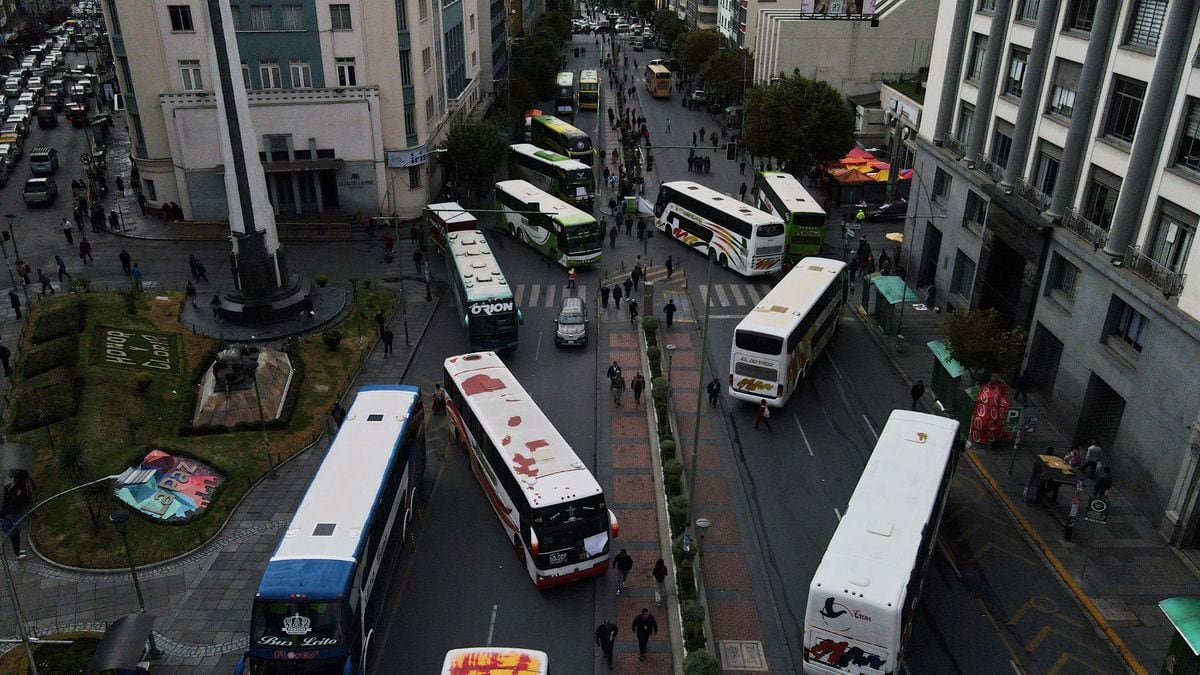For 11 days, Bolivia's main highway, which connects the administrative capital, La Paz, with the prosperous Santa Cruz de la Sierra, has been blocked by peasants who follow former president Evo Morales.
There are also less significant cuts on other roads in the country.
The protest has caused fuel shortages, price increases and economic losses estimated at $600 million.
He has put President Luis Arce on the ropes, previously considered “Brother Lucho” and today a “traitor” to the movement led by Morales.
The Government has not wanted to repress roadblocks, which it considers “part of the country's political culture.”
He is confident that they will dissolve on their own when the carnival, which is a very important holiday for Bolivians, approaches.
The demands are related to the disqualification of the former president for candidacy in 2025 by the Plurinational Constitutional Court (TCP), the institution against which the protesters are crashing.
In recent days, the “evista” farmers have wanted to “radicalize”, that is, increase the number of cuts to increase pressure on the authorities, who, for their part, have denounced that the majority of the blockade points were established by coca growers “carried” by their leaders from Chapare, the coca growing area of Cochabamba and Morales' stronghold.
According to the Government, his strength has been reduced to the same as it was in the 90s, when he was the leader of coca and had not yet formed the Movement towards Socialism (MAS).
“We are tired of the Bolivian justice system, which only cheats,” one of the protesters declared on television.
The road that could be seen next to it was full of stones thrown the previous days to prevent vehicle traffic.
In other places, actions like this of blocking roads with rocks are considered crimes, but not in Bolivia.
At least, until now.
In the midst of the current conflict, the business union presented a bill to punish roadblocks with jail time, as they prevent the transfer of goods and cause serious losses to producers and merchants.
Simultaneously, the Vice Minister of Government Coordination and Management, Gustavo Torrico, declared that “road blockades are, almost, a part of Bolivia's culture.
The problem is why it crashes.
If it is against a dictatorship, for example, the people have every right to block, but if it is a personal matter, like the disqualification [of Evo Morales], it is wrong.”
The protesters demand the resignation of all judicial courts in the country, started by the TCP.
For the Government, what they are really looking for is a way to annul constitutional ruling 1010/2023, approved in December of last year, which prohibits a president from governing more than twice, whether continuously or discontinuously.
This clause removed Morales, who has already held power three times, from the electoral game.
The request for general resignation of the high courts is based on the fact that the mandates of its members constitutionally ended on December 31, 2023. Shortly before this date, the TCP approved the sentence that disqualifies Morales and issued other verdicts that benefit the Government ;
Finally, he ordered his own extension and that of the other courts, until Parliament manages to organize judicial elections.
These were to be held in 2023, but the Legislative Assembly was unable to convene them.
The “evistas” believe that the continuity of the magistrates is illegal and has been the price they have charged in exchange for disqualifying Morales.
In the heat of the roadblocks, a multiparty legislative commission, in which the ruling party reluctantly entered, began to debate a consensus law to hold the elections as soon as possible.
At that point, the TCP hindered the multiparty effort with a ruling ordering lawmakers not to consider this law without first agreeing to the extension of the court orders.
Since the question of whether or not to accept this extension irreconcilably separates the parties that were seeking a solution to the conflict, it has been compromised.
The opposition considers this action an extension maneuver for the TCP.
It wouldn't be the first.
Disregarding the precept that a judge should not rule on matters that may affect him, the Bolivian TCP has stopped with a series of unconstitutionality rulings the different measures adopted by the Legislature to carry out judicial elections.
The opposition believes that, in reality, it has acted to prevent them.
And the Government has helped him, interested in preserving Arce's influence over justice.
After the TCP's latest measure, strong recriminations broke out against “the dictatorship of the Constitutional Court” and its attempt to subject Parliament to its will.
“They have surpassed all limits of legality, ethics and rationality,” wrote former president and opposition leader Carlos Mesa in
We cannot allow this aberration, unprecedented in history, which puts the democratic system at serious risk,” he posted.
Bolivia has had judicial elections every six years since the approval of its new Constitution in 2009. It is the only country in the region that elects its senior judges in this way.
The elections that were scheduled for last year were canceled because the Legislative Assembly did not have the majority it needed, two-thirds of the votes, to approve the call.
This majority became unattainable due to the division of the once hegemonic MAS into two wings, one under Morales and the other behind Arce.
The opposition, including the “evismo”, has joined forces in various initiatives to, despite this, manage to call the elections, but has not been able to overcome the resistance of the ruling party in Parliament and that of the magistrates themselves, who have control of constitutionality of the country.
Follow all the information from El PAÍS América on
and
X
, or in our
weekly newsletter
.

